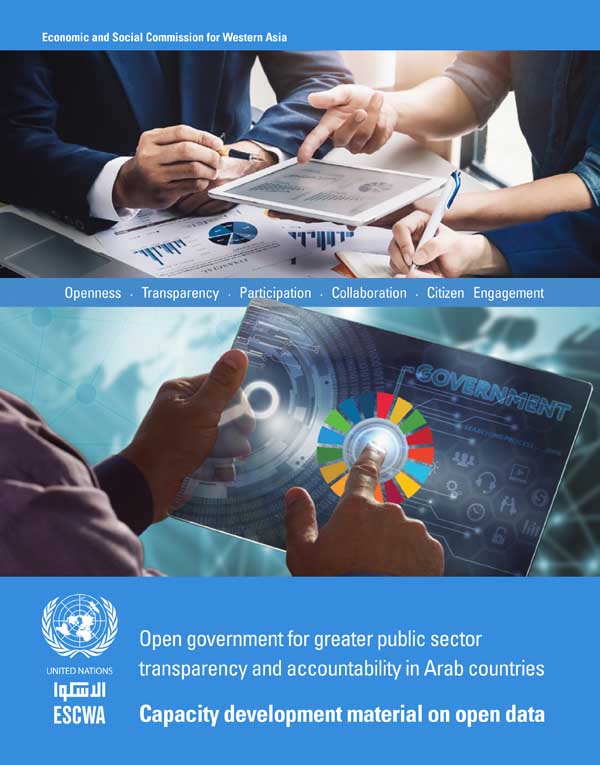
ESCWA Publication: E/ESCWA/TDD/2019/TP.1
Country: Arab region
Publication Type: Reports & studies
Cluster: Statistics, Information Society and Technology, Governance and Conflict Prevention
Focus Area: Governance & enabling environment, Technology & innovation
Initiatives: Arab Open and Innovative Government, ENACT project
SDGs: Agenda 2030, Goal 16: Peace, Justice and Strong Institutions, Goal 17: Partnerships for the Goals
Keywords: Administrative reform, Arab countries, Developing countries, Digital technology, Government information, Information technology, Innovations, Technical cooperation
Capacity development material on open data
January 2019
The report offers practical guidelines on how to initiate and manage open government data programmes, and it is targeting public sector employees in the Arab countries. The data we create, and copy is doubling in size every two years. Data is being referred as the new oil, and an important driver of growth and change. Flow of data has created new infrastructure, new businesses, new economics, new models for the public sector and also new monopolies.
Governments have and collect large amounts of data through its services. This data can be used in various ways to improve social and economic life of people. Thus, through opening government data, enterprises and organizations can use it to develop new services. Additionally, openly publishing government data increases transparency in government operations making it possible to better hold the government accountable for its actions, and it supports the achievement of SDG 16. Open data also has important role for achieving all the other SDGs. To ensure the sustainable access to government data, it is necessary to launch a well-planned initiative for open data at national and institutional levels. This guideline explains open data and its relationship to better governance and the SDGs. It offers a phased approach to plan, implement and manage open data initiatives, as well as steps on data cataloguing, data quality, and evaluating initiatives. Tools and platforms are described, while case studies provide a look at initiatives in some developed and developing countries.
Related content
Governance & enabling environment
, Technology & innovation
,
The report offers practical guidelines on how to initiate and manage open government data programmes, and it is targeting public sector employees in the Arab countries. The data we create, and copy is doubling in size every two years. Data is being referred as the new oil, and an important driver of growth and change. Flow of data has created new infrastructure, new businesses, new economics, new models for the public sector and also new monopolies.
Governments have and collect large amounts of data through its services. This data can be used in various ways to improve social and economic life of people. Thus, through opening government data, enterprises and organizations can use it to develop new services. Additionally, openly publishing government data increases transparency in government operations making it possible to better hold the government accountable for its actions, and it supports the achievement of SDG 16. Open data also has important role for achieving all the other SDGs. To ensure the sustainable access to government data, it is necessary to launch a well-planned initiative for open data at national and institutional levels. This guideline explains open data and its relationship to better governance and the SDGs. It offers a phased approach to plan, implement and manage open data initiatives, as well as steps on data cataloguing, data quality, and evaluating initiatives. Tools and platforms are described, while case studies provide a look at initiatives in some developed and developing countries.


